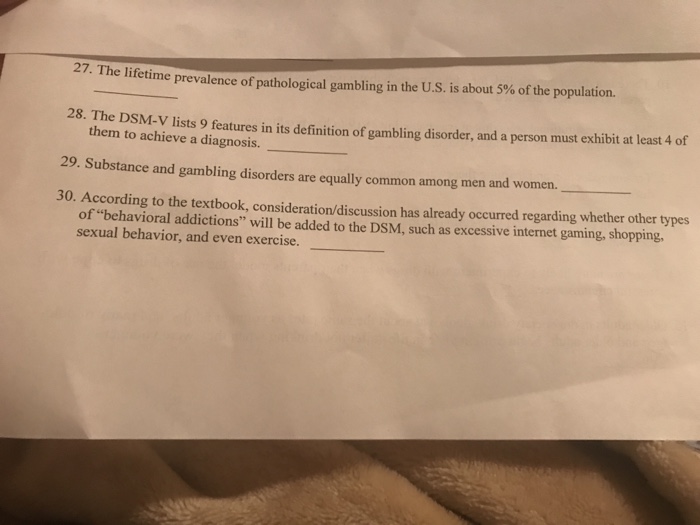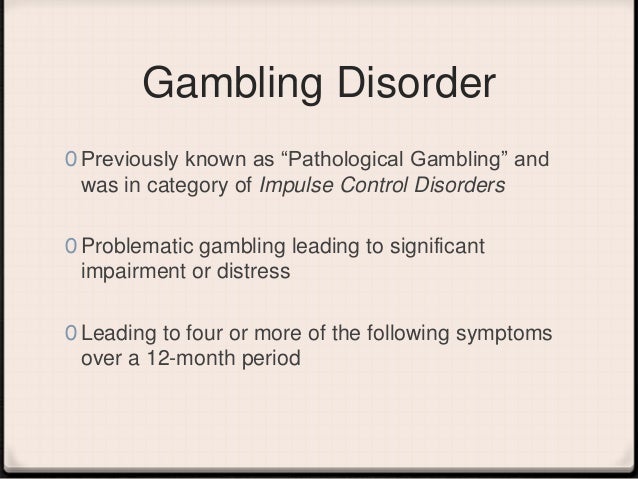Pathological Gambling Definition
What is gambling addiction, and how is it defined?
Compulsive and habitual gambling can destroy a person's life. He likely suffers personal problems and financial ruin, with problem gambling sometimes leading to a life of crime. Pathological Gambling explores America's experience of gambling, examining: The diverse and frequently controversial issues surrounding the definition of pathological gambling. Its co-occurrence with disorders such as alcoholism, drug abuse, and depression. Its social characteristics and economic consequences, both good and bad, for communities.
Over the past few decades, health professionals have discussed and debated the definition of various terms associated with problem gambling. Diagnostic phrases have varied from “pathological gambling” and “compulsive gambling” to “gambling addiction” and the latest diagnosis, “disordered gambling,” and the criteria for being diagnosed as having an addiction or being at-risk have changed along the way, as well.
In 2013, the fifth edition of the American Psychiatric Association’s Diagnostic and Statistical Manual of Mental Disorders (DSM) was published. Mental health providers look to the DSM for diagnostic criteria they use when working with insurance providers for treatment reimbursement.
Gambling Disorder in the DSM-5
The condition previously named pathological gambling was renamed gambling disorder and classified in the category “Substance-Related and Addictive Disorders.” Prior to the publication of the DSM-5, the condition was categorized as an impulse control disorder.
Another significant change to the definition and diagnosis of gambling disorder was the removal of one of the criteria for diagnosing gambling disorder. The criterion, “has committed illegal acts such as forgery, fraud theft or embezzlement to finance gambling” is no longer one of the criteria used for diagnosing gambling disorder. While it is true some individuals may have done illegal acts to gain access to money, it does little to help diagnose whether or not someone has the disorder.
Finally, the number of symptoms that must be identified to diagnose a gambling disorder has been lowered from five to four. This was done with the intention of decreasing the instances that a problem gambler’s disorder goes undiagnosed and therefore without help.
How The Changes in the DSM Help Problem Gamblers
At KnowTheOdds, we want to make sure people get the help they need. We must be able to properly diagnose individuals and guide them appropriately to opportunities for recovery.
The official definition of gambling disorder allows problem gamblers to understand that their addiction is something that affects millions of people – they are not alone in dealing with its consequences, and it is not their fault. The DSM-5 recognizes gambling disorder as a critical problem similar to drug and alcohol addictions, with the same affects on the individual.

If you or someone you know has a gambling disorder, help is available, and recovery is possible. Read stories of individuals who have recovered in “The Faces of Problem Gambling” and find hope.
Related Posts
Last updated: 04/1/2019
Author: Addictions.com Medical Review
Reading Time: 3minutes
Compulsive, also called problem, gambling may be a different disorder entirely from pathological gambling. Depending on your habits, you may be able to tell if you are a compulsive or a pathological gambler and where you should go to find help.
Pathological Gambling Definition Sociology
Compulsive Vs. Pathological Gambling
Problem or compulsive gamblers are individuals whose betting activities have become controversial, perhaps even dangerous. Their habits have likely led them to making mistakes, whether it is forgetting to pick up their children or taking care of something at home, calling into work so often their boss notices, or spending money meant for other things on wagering. However, they may be able to cut back on these activities if they realize the damage it is causing in their life.
According to the National Library of Medicine, “Pathological gambling is being unable to resist impulses to gamble, which can lead to severe personal or social consequences.” This also causes many issues in the individual’s life, but unlike the former disorder, pathological gamblers cannot stop these dangerous habits, even if they try. They will need serious professional help in order to do so, and they may need to stop gambling and cease any other activities related to it in order to avoid any issues in the future.
Which Type of Gambler Am I?

Pathological Gambling Definition Synonyms
A gambling problem can lead to financial issues and even bankruptcy.
Ask yourself the questions below. Make sure to answer truthfully in order to find out which disorder is more likely associated with your behavior and how serious your problematic wagering has become.
- Do you ever lie to others when you are going out to gamble?
- Would you always prefer to be betting, wagering, or playing instead of doing something else?
- Do you sometime feel bad after wagering too much or losing money?
- Do you ever use money meant for other things when you place bets?
If you answered yes to these questions, you may be a problem or compulsive gambler. You will likely be able to cut back on your habit with the help of your loved ones. However, it is also important to ask yourself the questions below as well:
- Do you feel restless, sad, anxious, or irritable when trying to cut back?
- Have these feelings caused you to go back to gambling?
- Have you ever committed a crime to get more betting money?
- Do you engage in these activities to escape your problems or the negative feelings you experience?
- Do you bet large sums of money to try and “make up” for past losses?
- Have you ever lost a job, relationship, education, or another important opportunity in the past due to this habit?
- Are you constantly preoccupied with how to make more money or win back your loses?
- Have you tried to quit or cut back more than twice and not succeeded?
- Do the other people in your life refuse to give you money?
If you answered yes to these questions, it is likely that you have an addiction and have become a pathological gambler. You will need professional addiction treatment in order to stop.